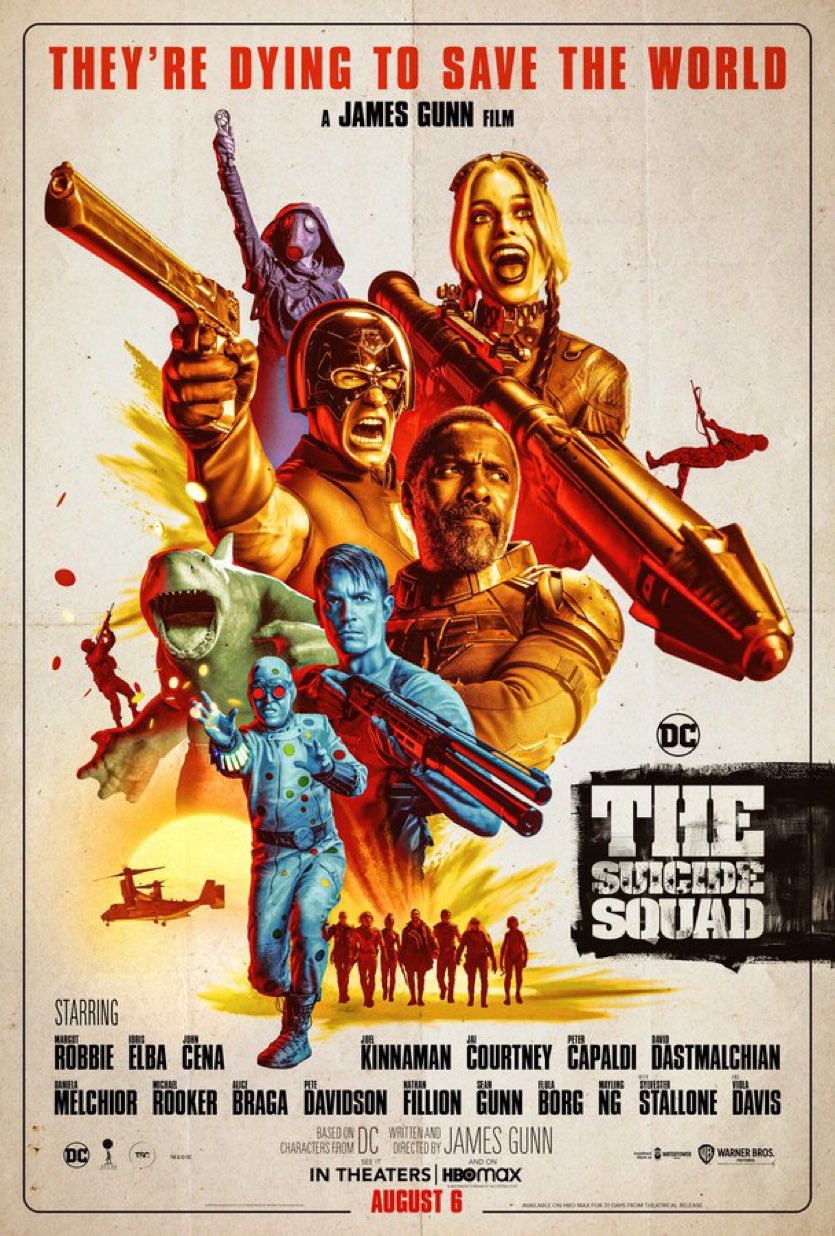One studio’s loss was another’s gain. And then the former’s gain again.
Facing blowback amid the discovery of crude and off-color tweets he posted a decade prior, Marvel Studios’ Commander-of-all-things “Guardians of the Galaxy” was sent packing by Disney in 2018. But another dream quickly came true for James Gunn, the veteran creative with ‘90s roots in the Troma Entertainment “B-Movie” revival game, when DC picked him up off the directorial waiver wire to make the bad guys go good like they should have the first go-around.
Early trailers – one memorably cut to Steely Dan’s “Dirty Work” – and marketing all but confessed that the same bunch introduced at the onset of “The Suicide Squad” would not be the main crew for the count. Inviting viewers to sympathize with its (anti)-heroes from the very get-go. With their counterparts dangled as human bait onto the Island of Corto Maltese, a “glass half empty”-thinking Suicide Squadder could argue they weren’t the “A” team hiding in the wings after all, but rather the “B” players. The scrapheap of the scrapheap. If you can’t sell such under-dogmatic appeal, what can you sell?
Like the IP recharge-at-large, Joel Kinnaman’s reprisal of Rick Flagg serves as a microcosmic representation of why second chances are essential. Sylvester Stallone’s King Shark, David Dastmalchian’s Polka-Dot Man, and Daniela Melchior’s Ratcatcher 2 were all breakout characters – while Margot Robbie further cemented her hold on Harley Quinn with a memorable breakout of her own. Her standout escape scene played out in almost “Kill Bill”-ian fashion, with Quentin Tarantino even calling it his “favorite sequence of the movie.”
The film itself is well-executed escapism incarnate; not dissimilar to “The Great Escape” (1963) – it’s prison setting proof that contained scenery encourages those trapped within its grasp to know their exit strategies like they know the back of the lethal weapons they call hands. Not to mention, “The Suicide Squad” doesn’t miss a single opportunity to unleash skin-shattering slaps to the face of authority, combating those whose reality is authority striking down upon them.
As a profoundly effective relaunch, “The Suicide Squad” operates as both a contribution to the superhero genre and a deconstruction of it – bloodsporting a, for lack of a better phrase, “vibe” that harkens back to that of the cutthroat playground. Where, when they weren’t roaming free, kids teamed up and pitted themselves against others in glorified-as-it-was-improvised combat.
Or better yet, the cool kids at the corner lunch table all trying to one-up one another while vying for the love and loathing of the remainder of the cafeteria. Forgotten gems from your past whose superheroic iterations’ heads are ticking time bombs because their grumpy principal has just about had it with their shenanigans. Thereby making them even cooler by default; because they’re not stepping up now to be stand-up guys. They’re stepping up because they’re those guys. Who you wanted to be, once upon a time, back during that brief period where grade school status plays were all that truly mattered.
Unfolding through-out: a moratorium on the notion that the men on a mission in “men on a mission” fare have to like each other. In many films of its kind, there is constant bickering, and even bloodshed, in the downtime between action sequen-ces, before bonding ultimately borders on becoming “mushy” by the story’s end. Here, the inverse occurs. Routine ego-clashing begets more chess pieces falling than even the liberal-better would wage within this adaptation of the comic book world’s favorite mortally-charged title. Thus, expect a body count, but don’t fear it. Far exceeding the number of character casualties is how often you’ll think just how much the most overdone genre needed this fiery breath of otherwise fresh air.
From the same, self-proclaimed “twisted” mind that helped bring two live-action “Scooby-Doo” films into the zeitgeist comes the hard-R where the “R” obviously stands for “ridiculous.” In fact, so ridiculous that you’ll eventually anticipate the aforementioned cartoon dog and his mystery-solving gang to lend their iconic van to Gunn’s latest assemblage of crime-fighting misfits. And, spoilers: become utterly saddened when this doesn’t transpire. Here’s hoping John Cena’s Pacemaker and Matthew Lillard’s Shaggy cross paths in the former’s upcoming HBO Max spinoff/origin story. Like, talk about a tandem. One kills for peace, and the other misplaced his.
Gunn’s past improprieties may have briefly blown up in his face. But the creativity bomb his personal Amanda Waller implanted in his head never stops ticking, even in defeat. After accepting his “Suicide” mission, not a day went by before the director inked his next gig. Disney relented, hiring him back for “Guardians of the Galaxy: Vol. 3” – his cinematic comfort zone. Though the years spent helping DC triumph over the curve he helped Marvel set manifested a new school of thought: Gunn is at his most Gunn when he’s free-wheeling, SOB-killin’. Hide your vanity plates if you see him coming around the bend.







